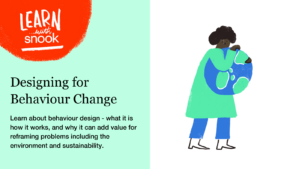The course runs over 2 half days allowing reflection time and space to fit within your working day.
Behaviour design draws from cognitive, social, evolutionary psychology and behaviour science, blending the rigour of science with the empathy of design to find out why people do the things they do and how we can use design experimentation to shift behaviour.
In this course we are explore how being Behaviour-focused can drive social and sustainable innovations within government, public and social sectors.
Through hands-on workshop activities, this course will introduce you to the basics of behaviour-centred design and how to take the first steps designing behaviours in your own organisation. We will take you through 4 core behaviour-centred activities that you can use in your usual design process.
You will learn:
- What is Behaviour Change Design and why it is important?
- Framing Behaviour: How to frame behaviour change design challenges.
- Mapping Behaviour: How to use practical tools and methods to sense-make and investigate the context for behaviour change.
- Diagnosing Behaviour: How to design a behaviour change intervention using the COM-B model of behaviour change.
- Designing & iterating interventions for Change: using EAST principles.
- Building a hypothesis for change: Generate a theory of change approach to building, testing and improving behaviour change interventions.
You will leave with practical knowledge, tools, templates and skills that we hope you will apply within your own role and projects.
This course is for:
- For those interested in bringing understanding of behaviours into their work.
- Individuals who are keen to learn practical ways to shift behaviours to sustainable ones.
